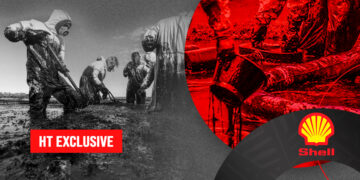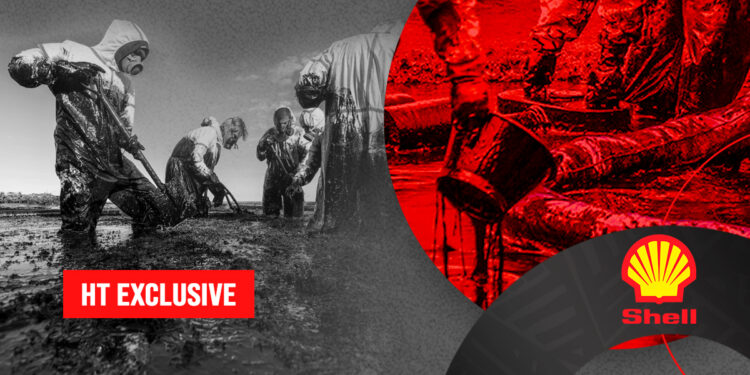By Emmanuel Nduka
Two weeks into 2024, Heritage Times HT reported that British energy giants Shell, has agreed to sell its Nigerian onshore Oil and Gas subsidiary to a consortium of mostly local companies for up to $2.4 billion, after nearly a century of operations in the West African country.
The deal as announced, marked a significant shift for Shell, which has been operational in Nigeria for over 90 years. The company has been active in Nigeria since the 1930s, and has struggled for years with hundreds of oil spills at its onshore operations. Shell have blamed crude oil thieves, sabotage and operational issues as factors costing it dear repairs and high-profile lawsuits. The complex operating environment in Nigeria’s onshore fields, coupled with pressure from climate change activism, may have also played a role in Shell’s decision to pull out of onshore operations in Nigeria. Deeper truths have also revealed that major oil spills by Shell are traceable to equipment failure, rusty and poorly maintained pipelines.
“This agreement marks an important milestone for Shell in Nigeria, aligning with our previously announced intent to exit onshore oil production in the Niger Delta”, said Shell’s Integrated Gas and Upstream Director, Zoë Yujnovich. Industry experts say the deal encompasses around 95,000 barrels of oil equivalent per day (boe/d) of production, making it one of the largest divestments in Shell’s entire history.
Exiting Nigeria, Leaving Decades-old Filth Behind
For years, Shell made itself chief polluter of Nigeria’s Niger Delta region which hosts Africa’s largest mangrove forest ecosystem and is home to one of the largest crude oil reserves on the continent. The spills have been a perennial problem in the oil-rich region, which cuts across nine states – Delta, Cross River, Edo, Abia, Imo, Bayelsa, Rivers, Akwa-Ibom and Ondo.
According to the National Oil Spill Detection and Response Agency (NOSDRA), between 2011 and 2022, 10,463 oil spill incidents were recorded in the Niger Delta region, exuding a combined 507,135 barrels of crude oil into the ecosystem, polluting farmlands and upending fishing activities. As the most recent, last year’s spill came from the Trans-Niger Pipeline operated by Shell that crosses through communities in the Eleme area of Ogoniland in Rivers State. “This is one of the worst in the last 16 years in Ogoniland,” Fyneface Dumnamene, an environmental activist said of the spill.
As stated in its ‘How We Respond To Spills’ operational standards as seen by Heritage Times HT on the Shell website, a list of steps are outlined when a spill occurs, including shutting down operations, notifying regulators…. “remediation and eventual clean up of the spill site… with the approval and certification of NOSDRA” on behalf of the Nigerian Government.
The United Nations Environment Programme in 2011 published a report on Shell’s decades-long pollution of the Niger Delta. The report recommended a comprehensive cleanup to restore polluted environments, especially in Ogoniland.
“More than 13,500 residents from the Ogale and Bille communities in the Niger Delta have now filed claims against Shell asking that the company clean up oil spills which they say have wrecked their livelihoods, poisoned their wells, and polluted their land and water, which means they can no longer farm or fish.
“Amnesty stands by these two communities in the Niger Delta, which have been engaged in litigation against Shell for seven years, asking that the company clean up the damage caused and compensate them for their lost livelihoods,” Mark Dummett, Amnesty International’s Head of Business and Human Rights said in reaction to the news that two Nigerian communities, which have been devastated by oil spills, have filed claims against Shell at the High Court in London.
Morria Alagoa, foremost Environmental and Human Rights Activist in the Niger Delta told Heritage Times HT in an exclusive interview that the report of the Bayelsa Oil and Environment Commission revealed that the state which is one of the nine Niger Delta states, is terribly pollutted by Shell’s activities. “Shell’s activities were part of the reported pollution. So, Shell cannot run away from the mess it created and go offshore to continue same pollution. We cannot forget in a hurry that large volumes of crude oil from Shell’s offs Bongo facility spread on the Sea in December, 2011 leaving several Fisher folks in Bayelsa and other states as victims without compensation or cleanup till today”.
“Ordinarily, Shell, like any other corporate organisation should enjoy the freedom to divest or sell off its assets to whoever is willing to buy and take over. Shell started in disposing off its OML 29 assets to Aiteo. As you know, OML 29 covers up to the Oloibiri oilfield (the Premier oilfield that launched Nigeria into the league of oil producing nations) in Ogbia local government, Nembe Creek and the Santa Barbara facilities and up to Okoroba in Nembe local government area of Bayelsa state.
“As freely as IOCs have right to divest, such divestment shouldn’t be done haphazardly; they should follow due process. Where there rights stops in the beginning of the rights of others. There are liabilities, not only assets. So, who will take care of the liabilities? Even if it is the buyers of the assets that would also take over the liabilities; stakeholders want to see where it has been put in black and white; that all the pending cases in court, legacy oil spill impacted sites, debts and compensations would be taken over by the new owners. Otherwise, Shell should know that it has shelled our environment and leaving shells for the communities it unacceptable.
“While it is important to warn the buyers, as a caveat that they should be ready to take over assets and LIABILITIES; it is of greater importance to let the federal government and her IOC partners know that the damaged environment must be addressed by the divesting IOCs; including other liabilities such as cases relating to oil industry induced pollution and compensations,” he told HT.
Court Victory Over Impacted Communities
Last year, the United Kingdom Supreme Court ruled in favour of Shell, positing that it was too late for Nigerian claimants to sue its two subsidiaries over a 2011 offshore oil spill. Heritage Times HT recalls that in December 20, 2011, there were allegations that an estimated 40,000 barrels of crude oil spilled when a tanker was loaded at Shell’s Bonga oilfield, 120km off the coast of Nigeria’s Niger Delta region. In her ruling on the matter, Justice May’s verdict was that more than 13,000 farmers and fishers from the Ogale and Bille communities in the Niger Delta were entitled to bring legal claims against Shell for alleged breaches to their right to a clean environment.
Civil Society Groups Asks Shell To ‘Properly Clean Up Niger Delta’ Before Onshore Exit
The Center for Peace and Environmental Justice (CEPEJ) through Sheriff Mulade, its National Coordinator told the new buyers to also consider buying the onshore liabilities left by Shell.
“As environmentalists and stakeholders of the Niger Delta, we have only one option. We are calling on the federal government to do the needful. But if the government fails, we will institute a suit restraining the sales of those assets, which we have already commenced.
“Because we will not allow Shell to exit our land until the proper cleanup is done. We would want to strongly appeal and advise the federal government led by President Bola Tinubu and the new buyers — the indigenous oil firms — to equally consider buying the onshore liabilities as well left by the SPDC if they wish to operate peacefully in the region,” Mulade added.
“The proposed sale of Shell onshore assets must include stringent provisions for addressing existing liabilities. These provisions should guarantee that the new owners assume responsibility for mitigating and rectifying environmental damage and restoring the affected community’s ecosystem.
“Allocate a portion of the proceeds from the sale towards comprehensive community development initiatives. These initiatives should focus on sustainable projects that enhance education, healthcare, infrastructure, and economic opportunities for the affected communities,” the CSO said.

































